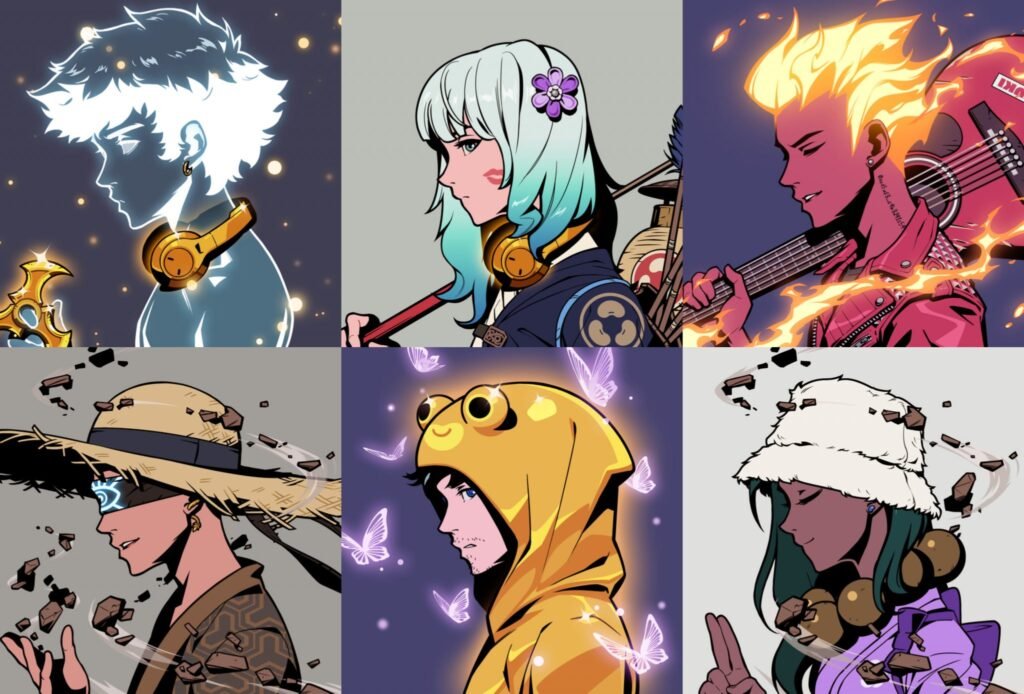Azuki, an anime-inspired PFP project featuring 10,000 NFTs, has captured the attention of the NFT community with its blend of exclusivity, intricate lore, and unexpected controversies.

Launched in January 2022, Azuki quickly gained popularity among NFT enthusiasts as a potential leader in the PFP-focused NFT market. Its high mint price and intricate roadmap fuelled the project’s initial exclusivity, amplified further by influencers who dubbed it a coveted asset.
Azuki comprises a collection of 10,000 generative avatar NFTs, each uniquely generated through randomised traits. The artwork draws inspiration from anime, combining elements from The World Ends with You and the iconic skateboarding magazine Thrasher.
Initially, Azuki planned to launch via a Dutch Auction, starting at 1 ETH and gradually decreasing to 0.15 ETH. However, the collection sold out its entire supply in a mere three minutes at the initial mint price, indicating strong demand and heightened hype.
The project’s expansive roadmap, announced early on, contributed significantly to its initial success. Azuki released 8,700 NFTs during the public sale, generating approximately 8,700 ETH (valued at over $29 million at the time). The subsequent private whitelist sale minted additional Azuki NFTs, raising around $2 million for the team.
Following the launch, Azuki achieved approximately $300 million in secondary sales volume across major NFT marketplaces, catapulting its popularity and floor price into the double digits.

Azuki was created by Chiru Labs, a Los Angeles-based group of artists and developers with backgrounds in crypto, technology, and gaming. Their vision extends beyond a simple PFP project, encompassing various sectors to be developed under the overarching Azuki brand.
The project’s success can be attributed to a combination of factors. The initial hype surrounding Azuki, fuelled by influencer support, contributed to its sustained value within the NFT space. Additionally, the ambitious vision of an Azuki universe, featuring immersive 3D experiences, merchandise, exhibits, and the native currency $BEAN, captured the imagination of the wider NFT community.
However, Azuki’s ascent was not without controversy. In May 2022, it was revealed that the founder of Azuki, Zagabond, was linked to failed and controversial NFT projects such as Tendies, CryptoZunks, and CryptoPhunks. The disclosure led to concerns and a decline in community sentiment, affecting the project’s floor price.
Despite the backlash, Zagabond issued an apology and continued to play a pivotal role in building the Azuki brand. The project remained resilient and introduced the Azuki Beanz collection, providing holders of original Azuki NFTs with additional NFTs via an airdrop. Beanz expanded the Azuki ecosystem while preserving the exclusivity of the original 10,000 NFT collection.
Furthermore, Azuki introduced Bobu Tokens, named after Azuki #40, Bobu the Bean Farmer, as an experiment in decentralised intellectual property. The tokens grant access to closed Discord channels, proposal voting, and other surprises within the Azuki ecosystem. The project also unveiled Hilumia, a virtual world exclusive to Azuki and Beanz holders, offering interactive experiences, games, and community incentives.

In April 2023, Chiru Labs announced a partnership with IPX, the parent company of Line Friends, a popular character brand. This collaboration opens doors for merchandise and real-life activations, expanding Azuki’s reach in both
Disclaimer: The following article is for informational purposes only. The content provided is based on the information available at the time of writing. Any investment or financial decisions should be made after careful consideration and research. The author and publisher do not endorse or promote any specific project or investment mentioned in this article. Readers are advised to conduct their own due diligence and seek professional advice before making any investment decisions.






